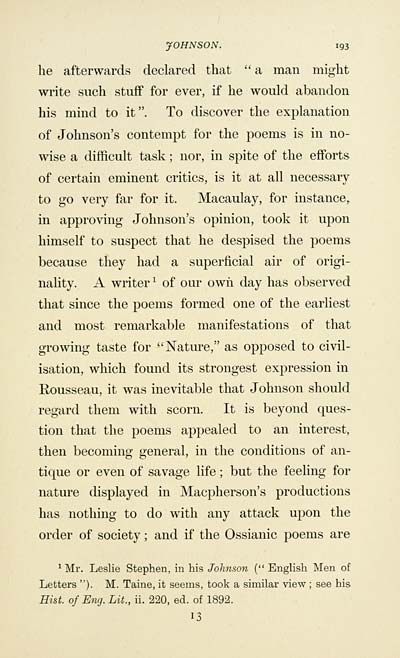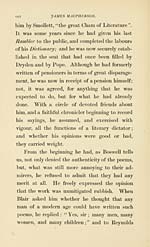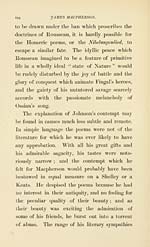Download files
Complete book:
Individual page:
Thumbnail gallery: Grid view | List view

yOHNSON. 193
he afterwards declared that " a man might
write such stuff for ever, if he would abandon
his mind to it". To discover the explanation
of Johnson's contempt for the poems is in no-
wise a difficult task ; nor, in spite of the efforts
of certain eminent critics, is it at all necessary
to go very far for it. Macaulay, for instance,
in approving Johnson's opinion, took it upon
himself to suspect that he despised the poems
because they had a superficial air of origi-
nality. A writer ^ of our own day has observed
that since the poems formed one of the earliest
and most remarkable manifestations of that
growing taste for "Nature," as opposed to civil-
isation, which found its strongest expression in
Eousseau, it was inevitable that Johnson should
regard them with scorn. It is beyond ques-
tion that the poems appealed to an interest,
then becoming general, in the conditions of an-
tique or even of savage life ; but the feeling for
nature displayed in Macpherson's productions
has nothing to do with any attack upon the
order of society ; and if the Ossianic poems are
^ Mr. Leslie Stephen, in his Johnson (" English Men of
Letters "). M. Taine, it seems, took a similar view ; see his
Hist, of Eng. Lit., ii. 220, ed. of 1892.
he afterwards declared that " a man might
write such stuff for ever, if he would abandon
his mind to it". To discover the explanation
of Johnson's contempt for the poems is in no-
wise a difficult task ; nor, in spite of the efforts
of certain eminent critics, is it at all necessary
to go very far for it. Macaulay, for instance,
in approving Johnson's opinion, took it upon
himself to suspect that he despised the poems
because they had a superficial air of origi-
nality. A writer ^ of our own day has observed
that since the poems formed one of the earliest
and most remarkable manifestations of that
growing taste for "Nature," as opposed to civil-
isation, which found its strongest expression in
Eousseau, it was inevitable that Johnson should
regard them with scorn. It is beyond ques-
tion that the poems appealed to an interest,
then becoming general, in the conditions of an-
tique or even of savage life ; but the feeling for
nature displayed in Macpherson's productions
has nothing to do with any attack upon the
order of society ; and if the Ossianic poems are
^ Mr. Leslie Stephen, in his Johnson (" English Men of
Letters "). M. Taine, it seems, took a similar view ; see his
Hist, of Eng. Lit., ii. 220, ed. of 1892.
Set display mode to: Large image | Transcription
Images and transcriptions on this page, including medium image downloads, may be used under the Creative Commons Attribution 4.0 International Licence unless otherwise stated. ![]()
| Early Gaelic Book Collections > Ossian Collection > Life and letters of James Macpherson > (211) |
|---|
| Permanent URL | https://digital.nls.uk/80361267 |
|---|
| Description | Selected books from the Ossian Collection of 327 volumes, originally assembled by J. Norman Methven of Perth. Different editions and translations of James MacPherson's epic poem 'Ossian', some with a map of the 'Kingdom of Connor'. Also secondary material relating to Ossianic poetry and the Ossian controversy. |
|---|
| Description | Selected items from five 'Special and Named Printed Collections'. Includes books in Gaelic and other Celtic languages, works about the Gaels, their languages, literature, culture and history. |
|---|

